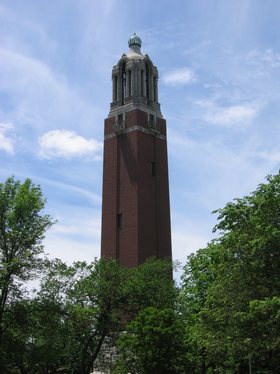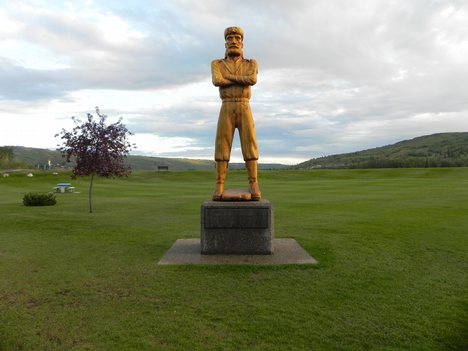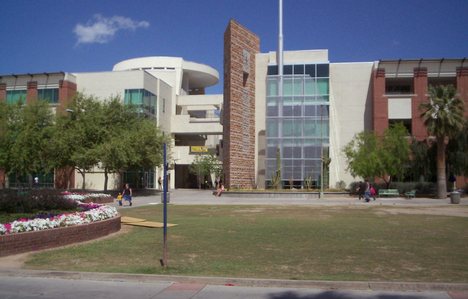![Lionel Messi - 100 Best Goals [Part 1 - 3] ligasampiona.rs Lionel Messi - 100 Best Goals [Part 1 - 3] ligasampiona.rs](http://web.archive.org./web/20110311182857im_/http://i.ytimg.com/vi/L-IOYCWyUZQ/0.jpg)
- Order:
- Duration: 14:59
- Published: 2010-11-23
- Uploaded: 2011-02-25
- Author: milos92
- http://wn.com/Lionel_Messi__100_Best_Goals_[Part_1__3]_ligasampionars
- Email this video
- Sms this video
| Title | Arena Football League |
|---|---|
| Current season | 2011 Arena Football League season |
| Logo | AFL-Shield.png |
| Pixels | 225px |
| Caption | Arena Football League |
| Sport | Arena football |
| Founded | 1987 |
| Inaugural | 1987 |
| Ceo | Jerry Kurz |
| Teams | 18 |
| Country | |
| Champion | Spokane Shock |
| Most champs | Tampa Bay Storm (5) |
| Tv | NFL Network |
| Website | ArenaFootball.com |
| Related comps | Gridiron Enterprises |
| Founder | Jim Foster |
The Arena Football League (AFL) is an indoor American football league founded in 1987 by Jim Foster. It is played indoors on a smaller field than American football, resulting in a faster-paced and higher-scoring game. The sport was invented in the early 1980s and patented by Foster, a former executive of the United States Football League and the National Football League.
The AFL would play 22 seasons from 1987 to 2008 before large debts forced the league to suspend operations in search of a more profitable business model. In December 2008 the league's owners canceled the 2009 season to begin work on developing a long-term plan to improve its economic model.
Unable to agree upon a viable economic plan for the future of the league, the AFL suspended operations indefinitely on August 4, 2009, with Chapter 7 bankruptcy liquidation following in December of that year. On September 28, 2009, Arena Football 1 was formed, containing many former AFL and af2 teams, as well as new franchises; AF1 purchased the AFL's assets (including its history and team names) in December 2009. On February 17, 2010, the AF1 announced it changed its name to the "Arena Football League", returning to the original league name. The league has its headquarters in Tulsa, Oklahoma and will play its games from April through August.
The league's championship game is known as the ArenaBowl.
Plans for arena football were put on hold in 1982 as the United States Football League was launched. Foster left the NFL to accept a position in the USFL. He eventually became executive vice-president with the Chicago Blitz, where he returned to his concept of arena football. In 1983, he began organizing the test game in his spare time around his job with the Blitz. By 1985, he had devoted all his time to arena football, and on April 26, 1986, his concept was realized when finally staged the test game. Sponsors were secured, and players and coaches from local colleges were recruited to volunteer to play for the teams, the Chicago Politicians and Rockford Metros, with the guarantee of a tryout should the league take off. Interest was high enough following the initial test game that Foster decided to put on a second "showcase" game. The second game was held on February 26, 1987 at the Rosemont Horizon in Chicago with a budget of $20,000, up from $4,000 in the original test game. Foster also invited ESPN to send a film crew to the game; a highlights package aired on SportsCenter. The game was deliberately not televised so that it could be analyzed and any follies and failures would not be subject to national public scrutiny. Following the inaugural game, tweaks and adjustments were made, and the first season continued. During the term of the patent, 20 years from the date of filing the application, any other league that formed to play indoor football would be forced to use rules and equipment that did not fall under Foster's patent; no indoor football league would be able to use the goalposts and rebound netting found in Foster's arena football. The patent expired on September 30, 2007, allowing indoor football leagues the chance to use some of arena football's innovations.
From the 1987 season until the late 1990s, the most exposure the league would receive was on ESPN, which aired tape-delayed games, often well after midnight. The league received its first taste of wide exposure in 1998, when Arena Bowl XII was televised nationally as part of ABC's Wide World of Sports.
One of the league's early success stories was the Detroit Drive. A primary team for some of the AFL's most highly regarded players, including George LaFrance, Gary and Alvin Rettig, as well as being a second career chance for quarterback Art Schlichter, the Drive regularly played before sold out crowds at Joe Louis Arena, and went to the ArenaBowl every year of their existence (1988–1993). The AFL's first dynasty came to an end when their owner, Mike Ilitch (who also owned Little Caesar's Pizza and the Detroit Red Wings) bought the Detroit Tigers baseball team and sold the AFL team.
Although the Drive left the league, the AFL had a number of other teams which it considered "dynasties", including the Tampa Bay Storm (the only team that has existed in some form for all twenty seasons), their arch-rival the Orlando Predators, the San Jose SaberCats of the present decade, and their rivals the Arizona Rattlers.
In 1993, the league staged its only All-Star Game in Des Moines, Iowa, the future home of the Iowa Barnstormers, as a fundraiser for flood victims in the area. The National Conference defeated the American Conference 64-40 in front of a crowd of 7,189.
While the aforementioned teams have enjoyed success, many teams in the history of the league have enjoyed little to no success. There are also a number of franchises which existed in the form of a number of unrelated teams under numerous management groups until they folded (an example is the New York CityHawks whose owners transferred the team from New York to Hartford to become the New England Sea Wolves after two seasons, then after another two seasons were sold and became the Toronto Phantoms, who lasted another two seasons until folding). There are a number of reasons why these teams failed, including lack of financial support from owners, lack of media exposure, or the city's plain disinterest in the team.
There were also several rule changes. In 2003, the season expanded to 16 games. In 2005, players were no longer allowed to run out of bounds. The only way for a player to go out of bounds is if a player is tackled into the side boards. 2005 also marked the first year the ArenaBowl was played at a neutral site. In 2007, free substitution was allowed. And in 2008, the Jack Linebacker was allowed to go sideboard to sideboard.
Three months later, "based on circumstances currently affecting the league and the team", Tom Benson startlingly announced that the New Orleans VooDoo were ceasing operations and folding. Shortly thereafter, an article in Sports Business Journal announced that the AFL had a tentative agreement to sell a $100 million stake in the league to Platinum Equity; in exchange, Platinum Equity would create a centralized, single-entity business model that would streamline league and team operations and allow the league to be more profitable. Benson's move to shut down the VooDoo came during the Platinum Equity conference call, leading to speculation that he had folded because of the deal.
Due to the sudden loss of the New Orleans franchise, the league announced in October that the beginning of the free agency period would be delayed in order to accommodate a dispersal draft. Dates were eventually announced as December 2 for the dispersal draft and December 4 for free agency, but shortly before the draft the league issued a press release announcing the draft had been postponed one day to December 3. Shortly thereafter, another press release announced that the draft would be held on December 9 and free agency would commence on December 11. However, the draft still never took place, and instead another press release was issued stating that both the draft and free agency had been postponed indefinitely. Rumors began circulating that the league was in trouble and on the verge of folding, but owners were quick to deny those claims. It was soon revealed the players' union had agreed to cut the salary cap for the 2009 season in order to prevent a cessation of operations.
High hopes for the AFL's waned when interim commissioner Ed Policy announced his resignation, citing the obsolescence of his position in the reformatted league. Two weeks later, the Los Angeles Avengers announced that they were formally folding the franchise. One month later, the league missed the deadline to formally ratify the new CBA and announced that it was eliminating health insurance for the players. Progress on the return stalled, and no announcements were made regarding the future of the league.
On July 20, 2009, Sports Business Journal reported that the AFL owed approximately $14 million to its creditors and were considering filing for Chapter 11 bankruptcy protection. In early August 2009, numerous media outlets began reporting that the AFL was folding permanently and would file for Chapter 7 bankruptcy. The league released a statement on August 4 announcing that while the league is not folding, it is suspending league operations indefinitely. Despite this, several of the league's creditors filed papers to force a Chapter 7 liquidation if the league did not do so voluntarily. This request was granted on August 7, though converted to a Chapter 11 reorganization on August 26.
All assets of the Arena Football League were put up for auction. The auction occurred on November 25, 2009. The assets were awarded to Arena Football 1 on December 7, 2009, with a winning bid of $6.1 million.
On February 17, 2010, AF1 announced it would use the "Arena Football League" name. The league announced plans for the upcoming season and details of its contract with NFL Network to broadcast AFL games in 2010. AF1 teams were given the option of restoring historical names to their teams. In addition to the historical teams, the league added two new expansion franchises, the Dallas Vigilantes and the Jacksonville Sharks.
On June 18, 2010, the league announced that the Philadelphia Soul, the San Jose SaberCats, and the Kansas City Brigade would return to the Arena Football League for the 2011 season.
The Pittsburgh Power was announced as an expansion team for the 2011 season on August 20, 2010.
The Alabama Vipers will relocate to Gwinnett County, Georgia, in suburban Atlanta, and take the name of the Georgia Force.
On September 14, 2010, WWL Radio reported that the New Orleans Voodoo will be returning to the Arena Football League. However, this time the team will not have Saints owner Tom Benson as part of the ownership group.
The new divisional alignment was announced on October 21, 2010, which included several teams moving divisions. The Oklahoma City Yard Dawgz were not named in the new divisional alignment; on October 25, 2010 it was confirmed that the Yard Dawgz would not compete in the AFL in 2011.
* The Equipment: The official football is the same size and weight as the National Football League ball.
* The Players and Formations: Eight players on the field; 20-man active roster; four-man inactive roster.
* Substitution: Free substitution is allowed, but some players play both ways either by choice or to step in because of injury.
* Formation: Four (4) offensive players must line up on the line of scrimmage. Three (3) defensive players must be down linemen (in a three or four-point stance). Only the "Mac Linebacker" may blitz on either side of the center. Alignment is two (2) or more yards off the line of scrimmage. No stunting or twisting. Offensive motion in the backfield: One receiver may go in a forward motion before the snap.
* Timing: Four 15 minute quarters with a 15-minute halftime. The clock stops for out-of-bounds plays or incomplete passes only in the last minute of each half or when the referee deems it necessary for penalties, injuries or timeouts. Each team is allowed three (3) time-outs per half. In the last minute of the game, the clock stops if the team with the lead has the ball and fails to advance the ball past the line of scrimmage; this discourages teams with the lead from "taking a knee" (i.e., having the quarterback kneel shortly after taking the snap from center) near the end of a game.
* Movement of the Ball and Scoring: Four (4) downs are allowed to advance the ball ten (10) yards for a first down, or to score. Six (6) points for a touchdown. One (1) point for a conversion by place kick after a touchdown, two (2) points for a conversion by drop kick and two (2) points for successful run or pass after a touchdown. Three (3) points for a field goal by placement or four (4) points for a field goal by drop kick. Two (2) points for a safety.
* The Kicking: Kickoffs are from the goal line. Kickers may use a one-inch tee. Punting is illegal. On fourth down, a team may go for a first down, touchdown or field goal. The receiving team may field any kickoff or missed field goal that rebounds off the net. Any kickoff untouched which is out of bounds or hitting an overhead structure (i.e. scoreboard) will be placed at the 20-yard line or the place where it went out of bounds, whichever is more advantageous to the receiving team. If a kickoff goes beyond the end zone and stays in bounds (such as kicking it into the field goal "slack net" or if the ball goes under the net), the ball will come out to the 5-yard line. The same is true if a missed field goal attempt goes beyond the end zone and under the net. If the receiving player chooses not to take the ball out of the endzone (takes a knee) or is tackled in the endzone, the ball is placed on the 2½-yard line.
* Passing: Passing rules in Arena Football are the same as outdoor NCAA football in which receivers must have one foot inbounds. A unique exception involves the rebound nets. A forward pass that rebounds off of the endzone net is a live ball and is in play until it touches the playing surface.
* Overtime Rules: Overtime periods are 15 minutes during the regular season and the playoffs. Each team gets one possession to score. If, after each team has had one possession and one team is ahead, that team wins. If the teams are tied after each has had a possession, the next team to score wins.
Beginning with the 2003 season, the AFL made a deal with NBC to televise league games, which was renewed for another two years in 2005. In conjunction with this, the league moved the beginning of the season from May to February (the week after the NFL's Super Bowl) and scheduled most of its games on Sunday instead of Friday or Saturday as it had in the past. In 2006, because of the XX Winter Olympic Games, the Stanley Cup playoffs and the Daytona 500, NBC scaled back from weekly coverage to scattered coverage during the regular season, but committed to a full playoff schedule ending with the 20th ArenaBowl. NBC and the Arena Football League officially severed ties on June 30, 2006, having failed to reach a new broadcast deal. Las Vegas owner Jim Ferraro stated during a radio interview that the reason why a deal failed is because ESPN refused to show highlights or even mention a product being broadcast on NBC.
For the 2006 season only, the AFL added a national cable deal with OLN (now Versus) for eleven regular-season games and one playoff game.
On December 19, 2006, ESPN announced the purchase of a minority stake in the AFL. This deal includes television rights for the ESPN family of networks. ESPN would televise a minimum of 17 regular season games, most on Monday Nights, and 9 playoff games, including ArenaBowl XXI on ABC. The deal resulted in added exposure on ESPN's SportsCenter.
The AFL also had a regional-cable deal with FSN, where FSN regional affiliates in AFL markets carried local team games.
In 2010, the reconstituted AFL signed a deal with the NFL Network to carry a weekly Friday night package. The deal lasted for one year. The announcers for the network's telecasts were revealed on March 29, 2010.
For the 2010 season, local markets included regional broadcast contracts with teams respectively:
The AFL renewed its agreement with the NFL Network for the 2011 season.
{|class="wikitable sortable"
|-
!Year
!# of Teams
!Expansion Teams
!Folded Teams
!Suspended Teams
!Returning Teams
!Relocated Teams
!Name Changes
|-
|1987
|ALIGN=CENTER |4
|VALIGN=TOP |Chicago Bruisers
Denver Dynamite
Pittsburgh Gladiators
|
|
|
|
|
|-
|1988
|ALIGN=CENTER |6
|VALIGN=TOP |Detroit Drive
Los Angeles Cobras
New York Knights
|
|VALIGN=TOP |Denver Dynamite
|
|
|
|-
|1989
|ALIGN=CENTER |5
|
|VALIGN=TOP |Los Angeles Cobras
New York Knights
|
|VALIGN=TOP |Denver Dynamite
|
|
|-
|1990
|ALIGN=CENTER |6
|VALIGN=TOP |Albany Firebirds
Dallas Texans
|VALIGN=TOP |Chicago Bruisers
|
|
|
|VALIGN=TOP |Washington Commandos
(from Maryland)
|-
|1991
|ALIGN=CENTER |8
|VALIGN=TOP |Columbus Thunderbolts
New Orleans Night
Orlando Predators
|VALIGN=TOP |Washington Commandos
|
|
|VALIGN=TOP |Pittsburgh → Tampa Bay Storm
|
|-
|1992
|ALIGN=CENTER |12
|VALIGN=TOP |Arizona Rattlers
Charlotte Rage
Cincinnati Rockers
Sacramento Attack
San Antonio Force
|VALIGN=TOP |Denver Dynamite
|
|
|VALIGN=TOP |Columbus → Cleveland Thunderbolts
|
|-
|1993
|ALIGN=CENTER |10
|
|VALIGN=TOP |New Orleans Night
San Antonio Force
|
|
|VALIGN=TOP |Sacramento → Miami Hooters
|
|-
|1994
|ALIGN=CENTER |11
|VALIGN=TOP |Fort Worth Cavalry
Las Vegas Sting
Milwaukee Mustangs
|VALIGN=TOP |Cincinnati Rockers
Dallas Texans
|
|
|VALIGN=TOP |Detroit → Massachusetts Marauders
|
|-
|1995
|ALIGN=CENTER |13
|VALIGN=TOP |Connecticut Coyotes
Iowa Barnstormers
Memphis Pharaohs
St. Louis Stampede
San Jose SaberCats
|VALIGN=TOP |
|VALIGN=TOP |
Fort Worth Cavalry
|
|
|
|-
|1996
|ALIGN=CENTER |15
|VALIGN=TOP |Texas Terror
|
|
|
|VALIGN=TOP |Las Vegas → Anaheim Piranhas
Fort Worth → Minnesota Fighting Pike
(dormant from 1995)
|VALIGN=TOP |Florida Bobcats
(from Miami Hooters)
|-
|1997
|ALIGN=CENTER |14
|VALIGN=TOP |Nashville Kats
New Jersey Red Dogs
New York CityHawks
|VALIGN=TOP |Charlotte Rage
Connecticut Coyotes
St. Louis Stampede
|
|
|VALIGN=TOP |Memphis → Portland Forest Dragons
|
|-
|1998
|ALIGN=CENTER |14
|
|VALIGN=TOP |Anaheim Piranhas
|
|
|VALIGN=TOP |Massachusetts Marauders → Grand Rapids Rampage
(dormant for three years)
|VALIGN=TOP |Houston Thunderbears
(from Texas Terror)
|-
|1999
|ALIGN=CENTER | 15
|VALIGN=TOP | Buffalo Destroyers
|
|
|
|VALIGN=TOP |New York → New England Sea Wolves
|
|-
|2000
|ALIGN=CENTER |17
|VALIGN=TOP |Carolina Cobras
|
|
|
|VALIGN=TOP |Portland → Oklahoma Wranglers
|
|-
|2001
|ALIGN=CENTER |19
|VALIGN=TOP |Chicago Rush
Detroit Fury
|
|
|
|VALIGN=TOP |Albany → Indiana Firebirds
Iowa → New York Dragons
New England → Toronto Phantoms
|VALIGN=TOP |New Jersey Gladiators
(from New Jersey Red Dogs)
|-
|2002
|ALIGN=CENTER |16
|VALIGN=TOP |Dallas Desperados
|VALIGN=TOP |Florida Bobcats
Milwaukee Mustangs
Oklahoma Wranglers
|
|
|VALIGN=TOP |Nashville → Georgia Force
|
|-
|2003
|ALIGN=CENTER |16
|VALIGN=TOP |Colorado Crush
|
|VALIGN=TOP |Toronto Phantoms
|
|VALIGN=TOP |New Jersey → Las Vegas Gladiators
|
|-
|2004
|ALIGN=CENTER |19
|VALIGN=TOP |Austin Wranglers
New Orleans VooDoo
Philadelphia Soul
|
|
|
|VALIGN=TOP |Buffalo → Columbus Destroyers
|
|-
|2005
|ALIGN=CENTER |17
|VALIGN=TOP |Nashville Kats
|VALIGN=TOP |Carolina Cobras
Detroit Fury
Indiana Firebirds
|
|
|
|
|-
|2006
|ALIGN=CENTER |18
|VALIGN=TOP |Kansas City Brigade
Utah Blaze
|
|VALIGN=TOP |New Orleans VooDoo
|
|
|
|-
|2007
|ALIGN=CENTER |19
|
|
|
|VALIGN=TOP |New Orleans VooDoo
|
|
|-
|2008
|ALIGN=CENTER |17
|
|VALIGN=TOP |Austin Wranglers
Nashville Kats
|
|
|VALIGN=TOP |Las Vegas → Cleveland Gladiators
|
|-
|2009
|ALIGN=CENTER |15
|
|VALIGN=TOP |New Orleans VooDoo
Los Angeles Avengers
|VALIGN=TOP |Arizona Rattlers
Chicago Rush
Cleveland Gladiators
Colorado Crush
Columbus Destroyers
Dallas Desperados
Georgia Force
Grand Rapids Rampage
Kansas City Brigade
New York Dragons
Orlando Predators
Philadelphia Soul
San Jose SaberCats
Tampa Bay Storm
Utah Blaze
|
|
|
|-
|2010
|ALIGN=CENTER |15
|VALIGN=TOP |Alabama Vipers*
Bossier-Shreveport Battle Wings*
Dallas Vigilantes
Iowa Barnstormers*
Jacksonville Sharks
Milwaukee Iron*
Oklahoma City Yard Dawgz*
Spokane Shock*
Tulsa Talons*
Utah Blaze**
(* Former af2 team)
(** Former AIFA team)
|
|
|Arizona Rattlers
Chicago Rush
Cleveland Gladiators
Orlando Predators
Tampa Bay Storm
|
|
|-
|2011
|ALIGN=CENTER |18
|VALIGN=TOP |Pittsburgh Power
|VALIGN=TOP |Oklahoma City Yard Dawgz
|
|VALIGN=TOP |Kansas City Command
Philadelphia Soul
San Jose SaberCats
|VALIGN=TOP |Alabama Vipers → Georgia Force
Bossier-Shreveport Battle Wings → New Orleans VooDoo
|VALIGN=TOP |Kansas City Command
(from Kansas City Brigade)
|}
Category:Articles with inconsistent citation formats Category:Organizations established in 2009 Category:Indoor American football leagues in the United States Category:Defunct American football leagues * Category:Professional sports leagues Category:Organizations established in 1987 Category:Organizations disestablished in 2009 Category:Companies that have filed for Chapter 7 bankruptcy Category:Companies that have filed for Chapter 11 bankruptcy Category:Re-established companies
This text is licensed under the Creative Commons CC-BY-SA License. This text was originally published on Wikipedia and was developed by the Wikipedia community.
![Lionel Messi - 100 Best Goals [Part 1 - 3] ligasampiona.rs Lionel Messi - 100 Best Goals [Part 1 - 3] ligasampiona.rs](http://web.archive.org./web/20110311182857im_/http://i.ytimg.com/vi/L-IOYCWyUZQ/0.jpg)





![David Guetta feat. Akon - Sexy Bitch [HQ] LYRICS David Guetta feat. Akon - Sexy Bitch [HQ] LYRICS](http://web.archive.org./web/20110311182857im_/http://i.ytimg.com/vi/Xo_7bhk1UzA/0.jpg)
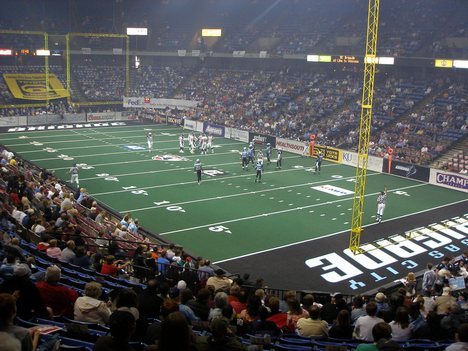




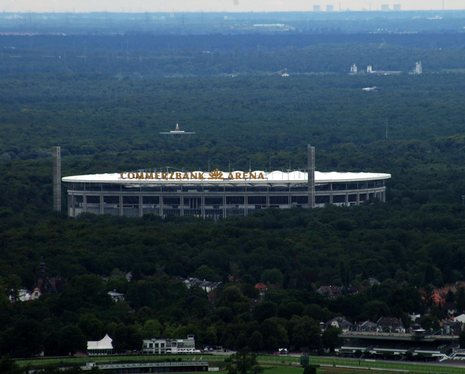


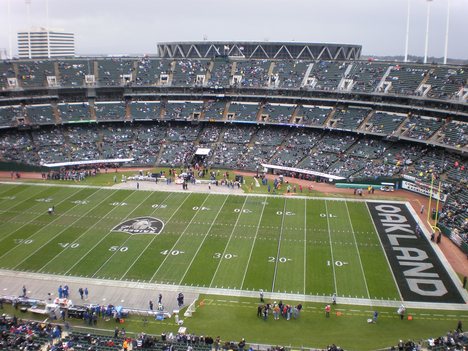




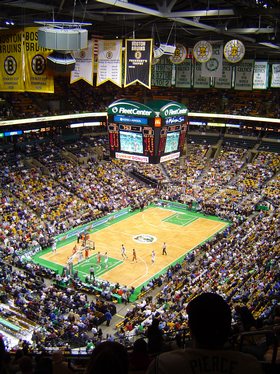
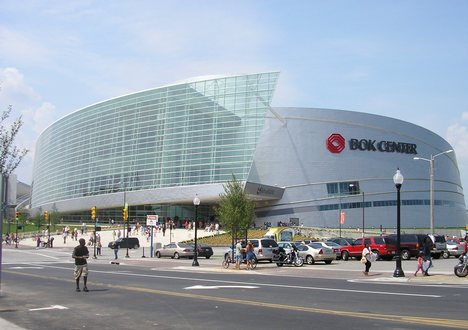



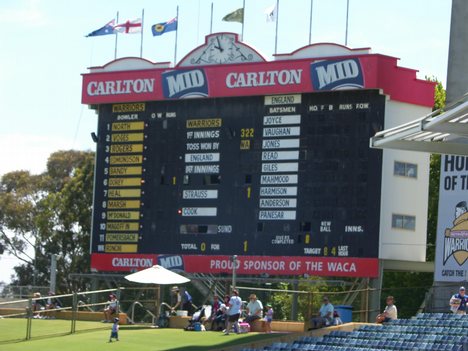





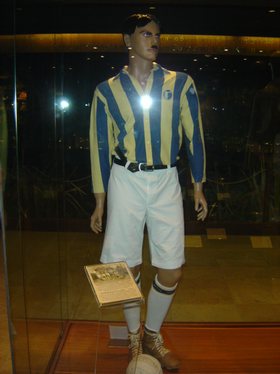
![Oakland-Alameda County Coliseum is a stadium located in Oakland, California, United States that is used for baseball, football, and soccer games. It is commonly referred to as The Oakland Coliseum or simply The Coliseum. It was formerly known as Network Associates Coliseum (1998-2004) and McAfee Coliseum (2004-2008) before its original name was restored in 2008.[2] The Coliseum is currently home to the Oakland Athletics of Major League Baseball and the Oakland Raiders of the National Football Le Oakland-Alameda County Coliseum is a stadium located in Oakland, California, United States that is used for baseball, football, and soccer games. It is commonly referred to as The Oakland Coliseum or simply The Coliseum. It was formerly known as Network Associates Coliseum (1998-2004) and McAfee Coliseum (2004-2008) before its original name was restored in 2008.[2] The Coliseum is currently home to the Oakland Athletics of Major League Baseball and the Oakland Raiders of the National Football Le](http://web.archive.org./web/20110311182857im_/http://cdn.wn.com/pd/d4/80/155781f3170d5c6075865765c16d_grande.jpg)
